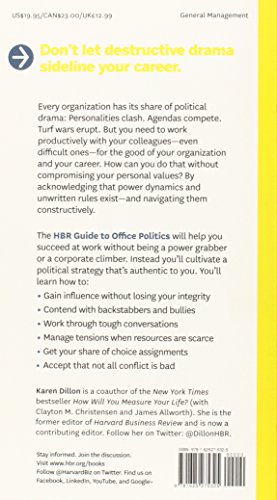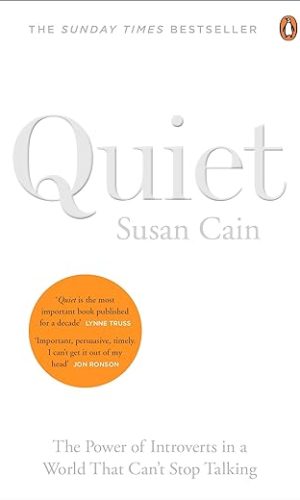HBR Guide to Office Politics
£12.20£13.30 (-8%)
Don’t let destructive drama sideline your career.
Every organization has its share of political drama: Personalities clash. Agendas compete. Turf wars erupt. But you need to work productively with your colleagues―even difficult ones―for the good of your organization and your career. How can you do that without compromising your personal values? By acknowledging that power dynamics and unwritten rules exist―and navigating them constructively.
The HBR Guide to Office Politics will help you succeed at work without being a power grabber or a corporate climber. Instead you’ll cultivate a political strategy that’s authentic to you. You’ll learn how to:
- Gain influence without losing your integrity
- Contend with backstabbers and bullies
- Work through tough conversations
- Manage tensions when resources are scarce
- Get your share of choice assignments
- Accept that not all conflict is bad
Arm yourself with the advice you need to succeed on the job, from a source you trust. Packed with how-to essentials from leading experts, the HBR Guides provide smart answers to your most pressing work challenges.
Read more
Additional information
| Publisher | Harvard Business Review Press (9 Dec. 2014) |
|---|---|
| Language | English |
| Paperback | 208 pages |
| ISBN-10 | 9781625275325 |
| ISBN-13 | 978-1625275325 |
| Dimensions | 13.34 x 1.91 x 22.86 cm |












by NoniTait
Interesting but nothing exceptional.
by Desi Epicurean…
Pretty decent read. with useful pointers
by Mal
It is a ok read not transferable to all industries
by Manisha Malhotra
First jobs come with a lot of challenges. Especially for people moving from research backgrounds to the corporate world. This book takes you through a series of examples and explains through the eyes of a beginner in the corporate world and an expert. It gives you possible solutions to a situation instead of preaching with fancy words and tag-lines. I would highly recommend this for professionals in any stage of their career.
by Robert Morris
In HBR Guide to Office Politics, published by Harvard Business Review Press 2014), Karen Dillon offers an abundance of information, in sights, and counsel that can help almost anyone to rise above rivalry, avoid power games, and build better relationships, not only at work but in all other dimensions of their lives.
I cannot recall a prior time when I have observed or heard about more incivility in the workplace than I do now. Courtesy is hardly common. There is severe pressure on everyone to produce more and better work in less time, and at a lower cost. Electronic devices enable almost anyone to connect with almost anyone else, anywhere and at any time and yet many (most?) workers, paradoxically, feel out-of-touch with, if not alienated from their associates. This is the context, the workplace culture, within office politics are most likely to thrive.
At the outset, she offers four invaluable caveats to those who find themselves engulfed in “playing politics.”
o Question your reaction: When people appear to be playing political games, we often think we know their motives, but sometimes we’re off the mark. Step back and reevaluate: What else could be driving the behavior? Maybe it’s not as vengeful as it seems — or even intentional.
o Try removing yourself from the equation: Everybody brings her own quirks, worries, and stresses to work. What you assume is a personal attack may have absolutely noting to do with you.
o Accept that not all conflict is bad: Great performance can come out of being challenged by an aggressive colleague or being forced to collaborate with someone you can’t stand. We can and often do rise to challenges. Don’t assume ‘uncomfortable’ means bad.”
o Keep your cool: Office bullies and other game players win every time they see they’ve rattled you. Never give them that satisfaction — you’ll just perpetuate the problem. Stay composed, and they’ll lose their power.
She wrote this book for those who are now in urgent need of assistance with achieving these goals: to increase their influence without compromising their integrity, contend with backstabbers and bullies, working their way through really difficult conversations, manage tensions when resources are scarce and prospects are ambiguous, obtain their fair share of choice assignments (including promotions), and meanwhile, avoid the feeling that all conflict is bad.
With regard to the last point, it is well worth keeping in mind Harry Truman’s definition of politics as “the art of getting things done.” Those who comprise a workforce must decide which politics will be acceptable to help their organization to get the “right things done” and done right.
Karen Dillon concludes: “So what’s the main takeaway, if I had to boil it down to one? As organizational development and HR expert Susan Heathfield puts it, don’t try to be the boss’s pet — be [begin italics] everyone’s [end italics] pet. That is, devote your energy to being a terrific employee and colleague. You’ll find that you’re less preoccupied with all the jockeying that’s going on around you– and more focused on positive pursuits like performance, growth, and fulfillment.”
by Ogmios
Reasonable synopsis and some good advice.
by Bobby Tables
The promise was good: how to navigate through the choppy seas of office politics and avoid making a drama out of a crisis. Learning how to accept and tolerate your co-workers even if their behaviour would otherwise be destructive and make you want to hate them.
There is a broad range of information on offer, compartmentalised in relatively short chapters that cut to the chase. Four main sections frame the book – political challenges with your boss, political challenges with your colleagues, political challenges with your organisation and build your skills.
The advice on offer is broadly sound, relevant and actionable. There is nothing controversial or alarming there but maybe even more advice and hand holding would have been necessary for the reader to admit that there is a problem they wish to address. This can often be the most difficult step – to admit there is a problem. Fixing it might not be easy or even possible, but you cannot do anything until you really know there is an issue and what it is.
Unfortunately this reviewer could not really establish a connection with this book. A certain spark was missing. That is not to say that it is a bad book but it really struggled to stick its head above the crowd. It is reasonably priced and gives a fair amount of value for money, so it could be worthy of consideration even if you don’t get totally connected to it. What doesn’t work for one might work for another. It just felt a bit defocussed and lacking in identity at times.
There is sadly a need for books like this. As the author noted, a 2011 survey by the UK-based management-consulting company Revelation revealed that 95% of respondents said that manipulation and hidden agendas in the workplace had affected them personally. So if a book like this can reduce even if it cannot replace the problem, it could be a very cheap form of therapy. The company would benefit too, but here let’s be selfish and think about our own well-being first.
In conclusion, this is a book worthy of consideration if you even think there is a possibility that office politics are destroying your workplace. It is cheaper than a bottle of spirits and will do you a lot more good in the long run.
by Steve C.
Too focused on encouraging your capitulation. I need something more Game Of Thromes themed to right size corporate environments after this as continuously comes back to developing the robustness needed to deliver powerful and necessary change.